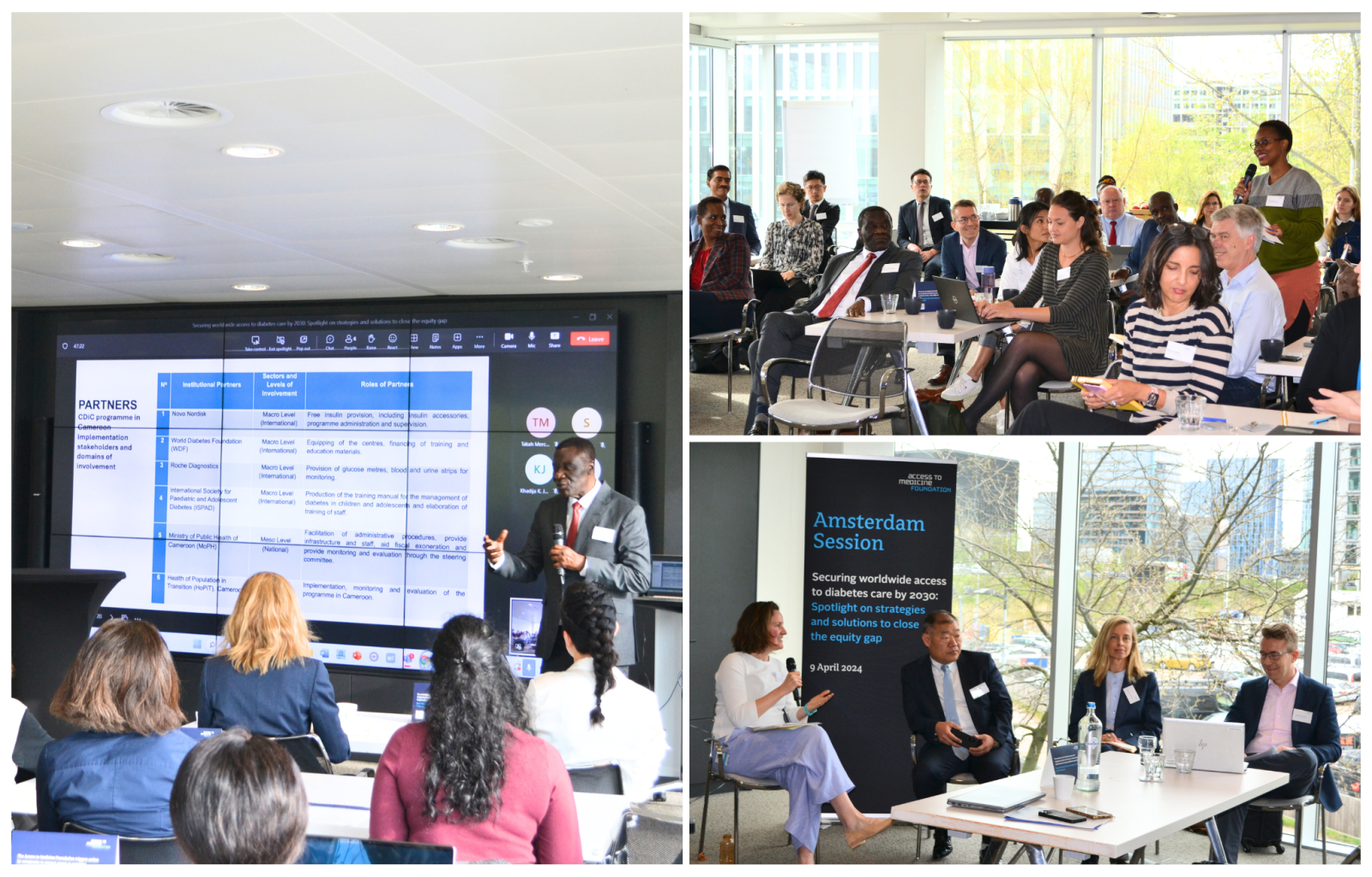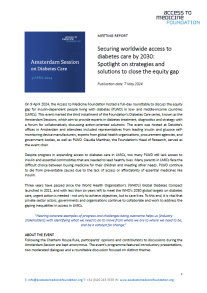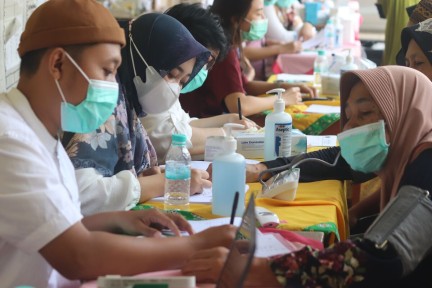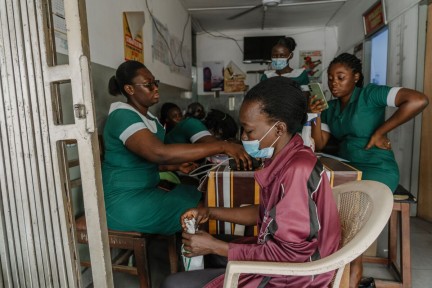Latest Amsterdam Session identifies strategies to accelerate expansion of diabetes care in LMICs
Diabetes is on the rise worldwide, but most future cases will occur in LMICs, where many PLWD still have limited access to lifesaving medicine like insulin and other essential diabetes care commodities.
Collaboration between industry stakeholders remains a crucial component to solving long-standing access issues and advancing efforts to make the full spectrum of diabetes products available and affordable to PLWD in LMICs.
Practical steps to widen the scope and scale of access to the diabetes continuum of care, alongside good practices and learnings that were identified during the event are captured in a new meeting report, available for download.

This latest Amsterdam Session provided a key opportunity for participants to assess progress the industry has made on commitments, access strategies and initiatives to make all insulin types and delivery devices available and affordable in LMICs and allowed for a wide range of perspectives to be shared. By providing a platform for participants, including leading manufacturers of insulins and glucose self-monitoring devices, global health organisations, procurement agencies, government bodies and PLWD to share practical examples of current approaches, the event elicited meaningful discussions and highlighted where further action is needed.
While the day’s discussions highlighted a great deal of progress in expanding access to diabetes care in LMICs, it also revealed that too many PLWD still lack access to insulin and essential commodities that are needed to lead healthy lives.
Addressing the issue of diabetes access requires a collective effort, as no single organisation can solve this alone. Companies have a crucial role to play in ensuring equitable access to treatments and enabling true patient choice, including all types of insulins – both human and analogue, glucose monitoring devices, and other essential commodities. With time rapidly ticking away, urgent action is needed to achieve the ambitious global targets on diabetes care by 2030.
Encouragingly, the clear and numerous calls for action from PLWD, companies, ministry of health representatives and global health partners undoubtedly testified to overwhelming interest and willingness from the public, private and not-for-profit sectors to work collaboratively towards a joint commitment to improving the lives of PLWD.
Creating sustainable solutions to meet the needs of PLWDs in LMICs
The importance of including PLWD in designing solutions for access issues, which was a prominent sentiment at last year's session, was echoed in the 2024 Amsterdam Session by attendees. This is crucial to delivering care that addresses PLWDs’ comprehensive needs throughout their life, and to ensure the long-term success of access programmes. Event attendees also urged that PLWD in LMICs should receive the same 21st century standards of care as those in high-income countries. For instance, while analogue insulins have been considered essential medicines by the World Health Organization (WHO) since 2021, attendees reported that availability is still limited to human insulin in many communities in LMICs. While there is still a way to go in making sure PLWD of all ages in LMICs are considered in developing solutions, attendees reflected on positive steps that are being taken, as well as how to address persistent gaps. One company representative, for example, mentioned that it is making progress in integrating analogues into its LMIC access programmes, aiming to expand access to 300,000 insulin-dependent patients by 2030.
Following on from prioritising the needs of PLWD in LMICs, it is also crucial to develop long-term care solutions that reflect the reality of diabetes as a chronic condition. Discussions throughout the day emphasised the need for sustainable access programmes that will last beyond company commitments. While philanthropic efforts can help in the short term, attendees noted that these are unsustainable in providing long-term solutions to ensure quality care for PWLD over their lives. Future strategies must be designed around sustainability to ensure that PLWD have access to ongoing, reliable diabetes care that spans the life course.
Three key takeaways
While the day’s discussions were diverse and wide-ranging, the Foundation identified three key themes under which actions need to be prioritised. These clearly set out ways companies and stakeholders can accelerate efforts to widen the scale and scope of access to essential diabetes medicine and commodities for PLWD in LMICs.
It is essential that PLWD need to be included when designing any, and all, access solutions. This means soliciting PLWD for their input on procurement, developing training and educational resources, and assessing the effectiveness of programmes and policies. This strategy ensures that efforts stay focused on addressing the most pressing problems being faced by PLWD.
Solutions must be designed specifically for each location. While there is much to learn from existing, successful models, a ‘cookie-cutter’ approach won’t work across different communities. To that end, stakeholders should be open to developing partnerships with each other to create initiatives that align with local needs and, importantly, can sustain long-term outcomes over each patient's life-course.
Supply chain inefficiencies contribute to high medication and device prices for PLWD. Stakeholder collaborations should be made to reduce opportunities for marginal mark-ups that occur throughout long supply chains and result in high out-of-pocket costs. Procurement can also be coordinated more intentionally and collaboratively. Additionally, local manufacturing should also be developed where possible to reduce the length of the supply chain.
Further details of the discussion and a comprehensive list of ‘next steps’ for companies and stakeholders are shared in the PDF of the meeting report.
About the Amsterdam Sessions and the Foundation's Diabetes Care Programme
Through moderated workshops and panel discussions, the Foundation provides space for people working with and within the healthcare ecosystem to come together and discuss how to expand access to essential health products in LMICs.
The Foundation has organised Amsterdam Sessions and other workshops on topics including access to high-quality generic medicines, shortages and stockouts of lifesaving products, access to medical oxygen, and lessons learned from COVID-19.
This Amsterdam Session is part of the Foundation's Diabetes Care Programme, and followed on from two previous workshops in July 2022 and July 2023, respectively. The Programme also published a research report in October 2022 on how the drugmakers that dominate the world's insulin market can scale up access efforts globally.




